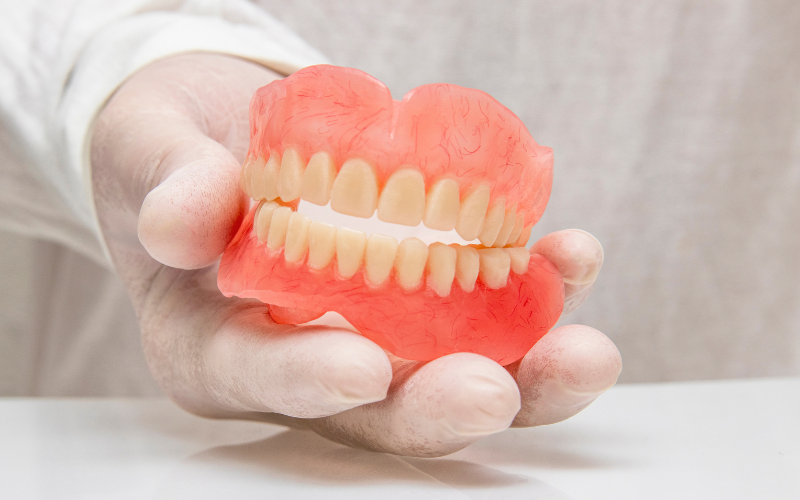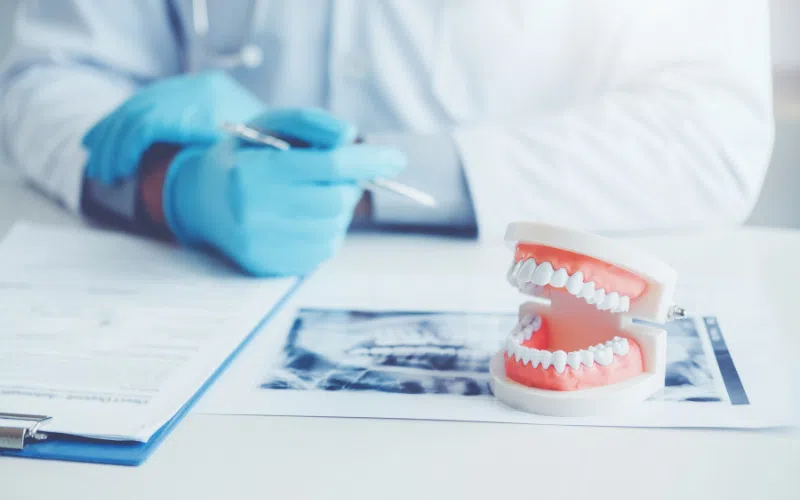Brentwood: (615) 235-1966

Eating with Dentures: Tips for Enjoying Food again
Brentwood, TN

Losing natural teeth can be challenging, but dentures offer a solution to restore your ability to eat and enjoy food. However, adjusting to dentures may take some time, especially when eating comfortably. This blog explores practical tips and techniques to make dining with dentures a pleasurable experience. From selecting denture-friendly foods to enhancing chewing efficiency, we’ll cover various strategies to help you savor your favorite meals once again. Whether you’re a new denture wearer or seeking to improve your eating experience, these insights will empower you to embrace dentures and regain your enjoyment of food.
Getting Used to Eating with Dentures
Adjusting to eating with dentures can take some time, but with patience and practice, it becomes easier and more comfortable. Here are some tips to help you get used to eating with dentures:
1. Start with Soft Foods: In the initial days, stick to soft and easily chewable foods like mashed potatoes, yogurt, scrambled eggs, and soups. Gradually introduce firmer foods as you become more accustomed to your dentures.
2. Cut Food into Small Pieces: Cut your food into smaller, bite-sized pieces to make it easier to chew and swallow. Avoid biting into large or hard items that may dislodge your dentures.
3. Chew Slowly and Use Both Sides: Take your time while chewing, and try to evenly distribute the pressure by using both sides of your mouth. This helps prevent denture movement and discomfort.
4. Avoid Sticky or Hard Foods: Stay away from sticky candies, nuts, and tough meats, as they can cause your dentures to shift or become loose.
5. Rinse After Meals: After eating, rinse your mouth and dentures with water or a denture cleaner to remove any food particles and maintain oral hygiene.
6. Use Denture Adhesive: If needed, consider using a denture adhesive to provide extra stability and prevent slippage during meals.
7. Practice Speaking and Chewing: Practice speaking and chewing at home to build confidence in your dentures before dining in public.
8. Attend Follow-Up Appointments: Visit your dentist for any necessary adjustments to ensure your dentures fit properly and comfortably.
Remember, it’s normal to experience some discomfort initially, but with time and practice, you’ll adapt to eating with dentures and enjoy your meals with confidence.
Choosing Denture-Friendly Foods
When you have dentures, it’s essential to choose foods that are denture-friendly to ensure comfortable eating and prevent any damage to your dental appliances. Here are some denture-friendly food choices:
1. Soft Fruits: Opt for soft fruits like bananas, peaches, and melons that are easy to chew and won’t strain your dentures.
2. Cooked Vegetables: Cooked and tender vegetables such as carrots, peas, and sweet potatoes are gentle on your dentures.
3. Soft Meats: Select tender meats like fish, chicken, and ground meats, as they are easier to chew and won’t put too much pressure on your dentures.
4. Eggs: Scrambled or boiled eggs are a great source of protein and can be enjoyed comfortably with dentures.
5. Pasta and Rice: Cooked pasta and rice are soft and easy to chew, making them denture-friendly options.
6. Dairy Products: Yogurt, pudding, and soft cheeses are gentle on your dentures and provide essential nutrients.
7. Soups and Stews: Enjoy soups and stews with well-cooked vegetables and soft meats for a nourishing and denture-friendly meal.
8. Soft Breads: Opt for softer bread varieties like whole-grain bread or white bread, which are easier to chew with dentures.
Remember to cut your food into smaller pieces and chew slowly to ensure ease of eating and to prevent any discomfort or damage to your dentures. Maintaining a well-balanced and denture-friendly diet will help you enjoy your meals and maintain good oral health.
Enhancing Chewing Efficiency
To enhance chewing efficiency with dentures, follow these tips:
1. Use Both Sides: Chew on both sides of your mouth simultaneously to distribute the pressure evenly and prevent denture movement.
2. Chew Slowly: Take your time when eating, and chew slowly and thoroughly to avoid putting excessive strain on your dentures.
3. Avoid Sticky Foods: Stay away from sticky or chewy foods that may dislodge your dentures or make chewing difficult.
4. Cut Food into Small Pieces: Cut your food into small, manageable pieces to make it easier to chew with dentures.
5. Be Mindful of Temperature: Avoid extremely hot or cold foods as they can affect the fit of your dentures and cause discomfort.
6. Practice Makes Perfect: In the beginning, stick to softer foods and gradually introduce more challenging items to improve your chewing ability.
7. Proper Denture Fit: Ensure your dentures fit properly, as loose-fitting dentures can cause irritation and difficulty in chewing.
8. Regular Dental Check-ups: Regular visits to your dentist will help monitor the condition of your dentures and ensure they are functioning optimally.
By following these tips and practicing patience, you can gradually improve your chewing efficiency and enjoy your meals with dentures more comfortably.
Tips for Enjoying Food with Dentures
To make the most of your dining experience with dentures, consider the following tips:
1. Start with Soft Foods: Initially, choose soft and easy-to-chew foods to help you get used to eating with dentures.
2. Chew Slowly: Take your time while eating and chew your food slowly and thoroughly to avoid any discomfort.
3. Cut Food into Smaller Pieces: Cut food into smaller, bite-sized pieces to make it easier to chew and prevent denture movement.
4. Avoid Sticky and Tough Foods: Stay away from sticky or tough foods that could cause your dentures to become dislodged or uncomfortable.
5. Opt for Moist Foods: Foods with some moisture, like soups or stews, can be more comfortable to eat with dentures.
6. Use Both Sides of Your Mouth: Chew on both sides of your mouth simultaneously to maintain balance and stability while eating.
7. Be Mindful of Temperature: Be cautious with hot or cold foods and beverages, as they can affect the fit of your dentures.
8. Stay Hydrated: Drink plenty of water to keep your mouth moist and comfortable while eating.
9. Avoid Hard Biting: Refrain from biting down on hard objects or using your dentures to open packages to prevent damage.
10. Practice Regularly: The more you eat with your dentures, the more comfortable and confident you will become.
Remember that adjusting to eating with dentures may take some time, but with patience and practice, you can enjoy a wide variety of foods while maintaining your oral health. If you encounter any persistent issues or discomfort, consult your dentist for adjustments or advice.
Overcoming Common Eating Difficulties
To overcome common eating difficulties with dentures, try the following strategies:
1. Start with Soft Foods: Initially, choose soft and easily chewable foods like yogurt, mashed potatoes, or scrambled eggs.
2. Cut Food into Small Pieces: Cut food into smaller, bite-sized pieces to make chewing more manageable and prevent denture movement.
3. Chew Slowly and Mindfully: Take your time while eating, chewing slowly and consciously to avoid discomfort or slippage.
4. Use Adhesive Creams: Denture adhesive creams can enhance stability, reducing the risk of dentures moving during eating.
5. Avoid Sticky or Tough Foods: Steer clear of sticky candies and tough meats, as they can be challenging to chew with dentures.
6. Rinse Mouth After Meals: After eating, rinse your mouth to remove any food particles and keep your dentures clean.
7. Gradually Introduce New Foods: As you get accustomed to eating with dentures, gradually reintroduce a wider variety of foods into your diet.
8. Practice Speaking While Eating: Talking while eating can cause dentures to shift, so try to speak minimally while chewing.
9. Take Small Bites: Opt for smaller bites to minimize the pressure on your dentures and reduce any discomfort.
10. Stay Patient and Persistent: Adjusting to eating with dentures takes time, so be patient and persistent in finding what works best for you.
By implementing these tips and staying patient, you can overcome common eating challenges and enjoy a more comfortable dining experience with dentures. If you continue to face difficulties, consult your dentist for further guidance and adjustments.
Maintaining Oral Health and Denture Care
To maintain oral health and care for your dentures, follow these essential practices:
1. Clean Dentures Daily: Remove your dentures and clean them thoroughly with a soft-bristled denture brush and mild soap or denture cleaner.
2. Brush Gums, Tongue, and Palate: Even with dentures, it’s crucial to brush your gums, tongue, and the roof of your mouth to prevent plaque buildup and maintain oral hygiene.
3. Handle Dentures with Care: When handling dentures, do so over a soft surface or a basin filled with water to prevent damage if they accidentally slip from your hands.
4. Soak Dentures Overnight: Soak your dentures in a denture cleaning solution or water overnight to keep them moist and maintain their shape.
5. Rinse After Eating: After eating, remove and rinse your dentures to eliminate food particles and prevent bacterial growth.
6. Avoid Using Toothpaste: Regular toothpaste can be abrasive and may damage dentures. Use a denture cleaner instead.
7. Regular Dental Checkups: Visit your dentist regularly for checkups and adjustments to ensure your dentures fit correctly and maintain your oral health.
8. Maintain a Balanced Diet: Eat a well-balanced diet with an emphasis on softer, denture-friendly foods to support your overall oral health.
9. Avoid Hot or Hard Foods: Refrain from consuming very hot or hard foods that may cause discomfort or damage to your dentures.
10. Handle Repairs Professionally: If your dentures crack, chip, or become loose, avoid attempting repairs yourself. Seek professional assistance from your dentist.
By following these guidelines, you can maintain good oral health and ensure the longevity and functionality of your dentures. Remember to be consistent with oral care and attend regular dental appointments for optimal results.
In conclusion, adjusting to eating with dentures may take time, but with patience and practice, you can regain the joy of enjoying your favorite foods. Following denture-friendly eating habits and maintaining proper oral hygiene are key to ensuring your dentures fit well, providing you with comfort and confidence in daily life. Regular dental checkups will also help address any issues promptly, ensuring a positive denture-wearing experience.




